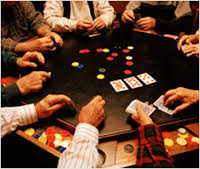 |
| Casino Cheat Brain Power |
The world´s best cheats use a powerful and
proven 10-step method to dummy-up casinos into believing their cheat moves are
legitimate bets and that they’re legitimate high rollers.
1) Buying the chips they need
away from the table they’re about to move on.
When a
casino-cheat team wants to do a blackjack move using $1,000 chips, they get
those $1,000 chips at the craps or baccarat table, thus avoiding any heat on
obtaining large-denomination chips at the blackjack table they’re targeting.
This gives them the element of surprise when putting them into dishonest play.
2) Making set-up bets to establish credibility as
a high roller.
When the team
pastposts or bet-switches a $1,000 chip, the person who will claim that phony bet will first make a
legitimate bet using the same denomination chip. The dealer and supervisor will
both remember this big original bet and not be suspicious when the same
high-roller appears claiming a bet-switch containing a $1,000 chip.
3) Using a little
psychological “force” when possible.
When trying to
manipulate a dealer’s mind, a little physical touch can go a long way. As
casino dealers are almost never touched, a switched-bet claimer can reach out
and gently tap the dealer’s hand to alert him to the cheat-move and speed up
the process of getting paid. This soft touch has the effect of whacking the
dealer’s head with a baseball bat because he’s totally shocked at being touched
at all by a player. The result is that he forgets what he´d seen in the betting
circle and therefore cannot contest the cheat’s claim as to how much is in the
circle now.
4) Betting back after the
switch goes down and gets paid.
The best way to
avoid post-move heat is to cool the casino down. Doing this entails a bet-back,
which is the same as the set-up bet but placed after the move goes down. If the cheat-move earned $1,000, then a
bet-back or two of $200 will do the trick. Of course those bets are at risk,
but in the long-run the cheats will only lose a small percentage of their cheat
gain.
5) Being gabby from the start
to the finish.
The best way to
control the situation at a table and avoid having it turn negative is to create
the mood the cheat-team wants, which is obviously a jovial one. When there is
talk and laughter at the table, it is much more difficult for negative reaction
and suspicion to surface. With this in mind, the cheat who is raking the cash
off the layout engages his gambling neighbors in affable conversation during
the entire time he’s at the table.
6) Chumming-up the
supervisor.
The cheat wants
to immediately establish a rapport with the supervisor, who is the second most
important person at the table and the one who ultimately determines whether or
not the cheat-move will be paid. As most supervisors come over and greet the
players, especially those showing big action, the cheat wants to ingratiate
himself right away. He thus accepts the supervisor’s offer to rate his play in
order to qualify for casino comps. What better outcome to get paid on a cheat-move
and then wine and dine yourself as the casino’s guest!
7) Not coloring-out chips at
the table.
Although the
cheat wants to leave the victim table as soon as possible after the move and
subsequent bet-backs, he doesn’t color-out his chips to a higher denomination.
Doing so gives the impression that the cheat may have finished his gambling and
is headed to the casino cage to cash out and then leave the casino. Not doing so leaves the impression that
the cheat who has just been paid on a bet-switch is still ripe for lots more
gambling and will probably give the casino back its money at another table.
8) Tipping the dealer.
Last thing a
top-cheat wants to do is leave the table having an unsatisfied dealer. If the
dealer is a little suspicious or upset, he might nudge his supervisor to call
surveillance to have them take a closer look at what went down on the table. A
good secret that cheats know is that a nice tip will remove most of the doubt
from the dealer’s mind.
9) Leaving the table
aggressively.
Another last
thing a cheat wants to do after cheating a casino game is leave the table as if
he’s trying to escape. Doing so will pop red flags in casino-employees’ minds.
Leaving sheepishly or in a hurry does not seem natural for a high roller who’s
just won a grand or more at the table. So the masterminding cheat walks off
with tailing conversation and laughter, maybe even a friendly slap on the back
or handshake to his neighboring player.
10) Avoid talking to the teller at the casino cage while cashing
out chips.
The chatter
cheats use to control the atmosphere with neighboring players and supervisors
at the table is not needed at the casino cage. Skillful cheats just lay their
chips on the counter and wait for the cash. If the teller has any questions as
they sometimes do, the cheat just answers them succinctly. As the casino cage
is a prime locale for money-laundering and other serious criminal operations,
the less felonious casino-cheat just wants to get outta there as soon as
possible.
Total psychological effect
Psyching out the
casino is probably the strongest weapon in the skilled casino-cheat’s arsenal.
Most actual cheat-moves are quite easy to do and contain nothing more than good
timing and hand-coordination. But the key to cheating-success is to keep the
casino oblivious to the very fact they are being cheated, and the only way to
do that is by building a psychological step-by-step ladder that leaves their
personnel so dumbfounded that they just go along for the ride.











